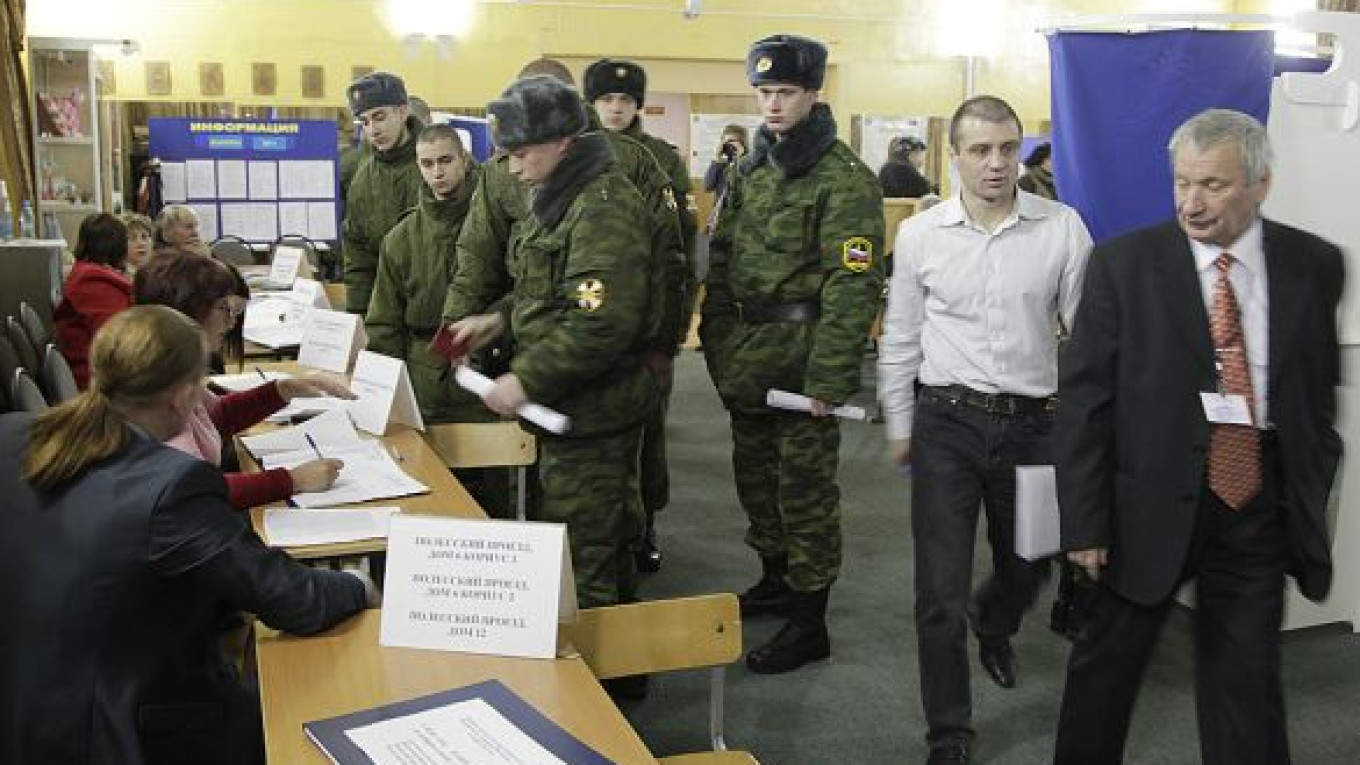The Dec. 4 State Duma elections failed to meet democratic standards and were fraught with violations, Europe's main elections watchdog said in a final assessment published Thursday.
The by the Organization of Security and Cooperation in Europe, or OSCE, mentions violations like "serious indications of ballot box-stuffing", so-called group-voting and obstructions for observers. It also reiterates criticism of United Russia from the organization's mission chief, Swiss diplomat Heidi Tagliavini, that the electoral "contest was slanted in favor of the ruling party."
"The distinction between the state and the governing party was frequently blurred by state and local officials," said the report's executive summary.
United Russia, led by Prime Minister Vladimir Putin, won the vote with 49 percent, 14 percentage points less than in 2007.
But the OSCE report also lambastes "narrowed political competition" because of the denial of registration of parties.
The document stops short of questioning the elections' legitimacy although it mentions the Dec. 10 and Dec. 24 mass protests, when tens of thousands in Moscow demanded the cancellation of the results and the dismissal of Central Election Commission boss Vladimir Churov.
The report ends with a list of 21 recommendations (to the government, political parties and civil society), in order to support "efforts to conduct elections fully in line with OSCE commitments and other standards for democratic elections," thus diplomatically paraphrasing the failure to meet these requirements.
Among the priority requirements listed in the report are "stronger efforts to ensure sufficient separation between the state and party" and a commitment by state authorities "to properly and effectively implement the principles of democratic elections."
The report's authors also question the independence of election administrators by recommending safeguards "to ensure the impartiality and full independence of election commissions from the authorities."
The criticism comes as a slap in the face for the Central Elections commission, whose chairman Churov has regularly questioned the need for foreign elections observers.
The Commission swiftly dismissed the report as biased. "This is a political assessment," commission member Tatyana Voronova told Interfax.
The? criticism echoes earlier comments by the Foreign Ministry, which said that the OSCE's preliminary report published one day after the Dec. 4 vote was not objective and politicized, and that it was up to the Russian people to make the? final judgment about the? voting.
Although the Soviet Union was a founding member, Moscow has had a rocky relationship with the OSCE in the past.
Ties reached an all-time low in 2007 and 2008, when the 56-member organization cancelled its observer missions for both the Duma and presidential elections, citing unprecedented restrictions.
However, relations have improved since Slovenian diplomat Janez Lenarcic took over the OSCE's Office of Democratic Institutions and Human Rights in Warsaw, which conducts the observation missions.
Last October Lenarcic grudgingly accepted to send just 200 observers for the Duma vote, 60 less than he had proposed.
On Dec. 30, the commission sent an official invitation to the OSCE to observe the March 4 presidential vote, according to a letter from Lenarcic to Churov, on the commission's web site.
The OSCE has confirmed that the mission will have the same size as for the parliamentary vote. Forty long-term observers are expected to arrive in the country at the end of January.
Including lawmakers from the OSCE and the Council of Europe's Parliamentary Assembly, the overall number of Western observers at the Duma vote was more than 300. It was unclear Thursday how many of the assemblies' deputies would observe the presidential vote.
The Council of Europe's Assembly's final report will be presented on Jan. 23 during the assembly's winter session in Strasbourg, which is expected to be attended by a Duma delegation.
National media speculated that the report might be harsher if published after an invitation to observe the March election has been issued, but analysts dismissed this Thursday.
"They understood that legitimacy is higher if foreign observers are present rather than not," said Nikolai Petrov of the Carnegie Moscow Center.
Petrov said the election commission's main goal was not to satisfy foreign election observers. "The first priority is to ensure that Putin wins in the first round," he said by telephone.
His words were echoed by opposition leader Boris Nemtsov, who said the wording of the OSCE report was of little meaning.
"The main point is that citizens know that the elections were falsified, not fair and not transparent and that Putin and Churov are responsible for this," he told The Moscow Times.
A Message from The Moscow Times:
Dear readers,
We are facing unprecedented challenges. Russia's Prosecutor General's Office has designated The Moscow Times as an "undesirable" organization, criminalizing our work and putting our staff at risk of prosecution. This follows our earlier unjust labeling as a "foreign agent."
These actions are direct attempts to silence independent journalism in Russia. The authorities claim our work "discredits the decisions of the Russian leadership." We see things differently: we strive to provide accurate, unbiased reporting on Russia.
We, the journalists of The Moscow Times, refuse to be silenced. But to continue our work, we need your help.
Your support, no matter how small, makes a world of difference. If you can, please support us monthly starting from just $2. It's quick to set up, and every contribution makes a significant impact.
By supporting The Moscow Times, you're defending open, independent journalism in the face of repression. Thank you for standing with us.
Remind me later.


